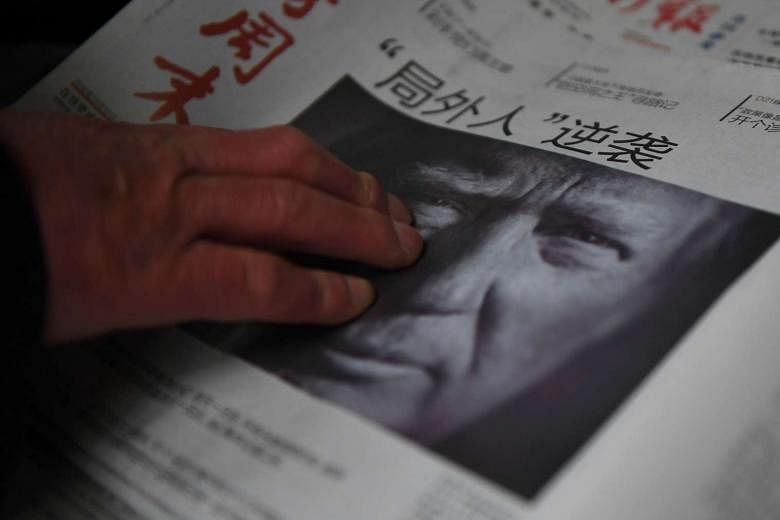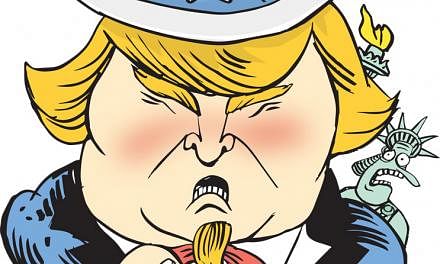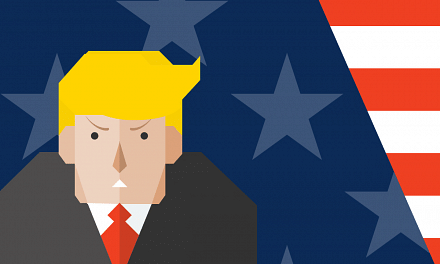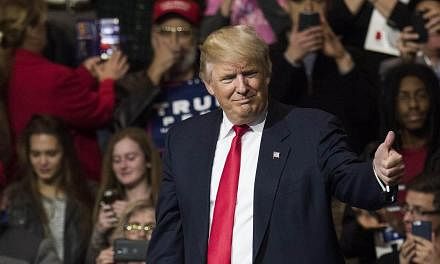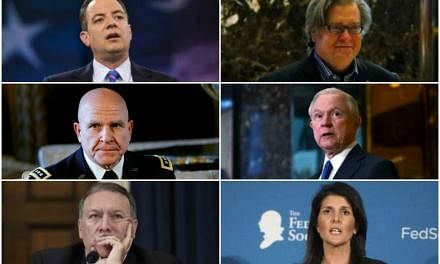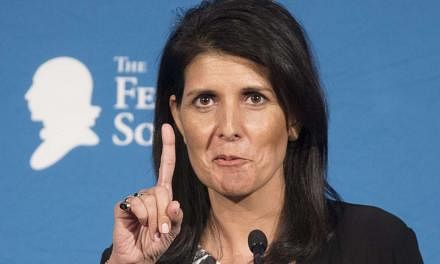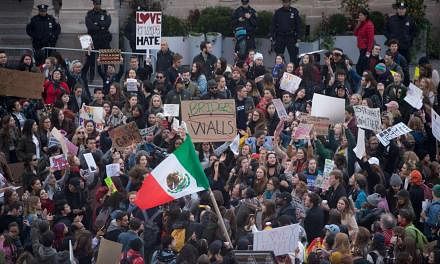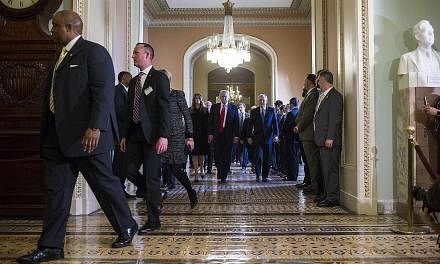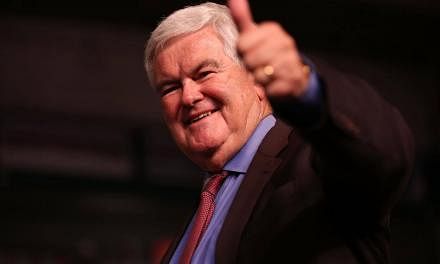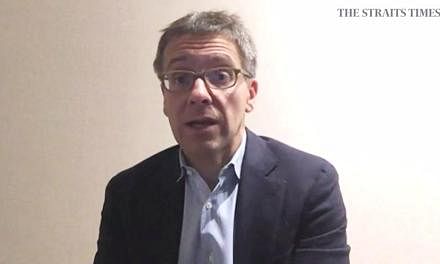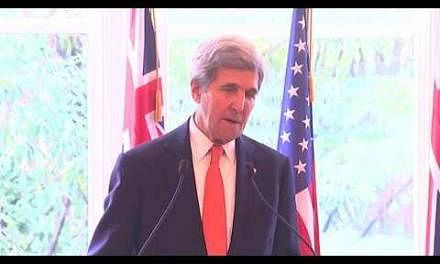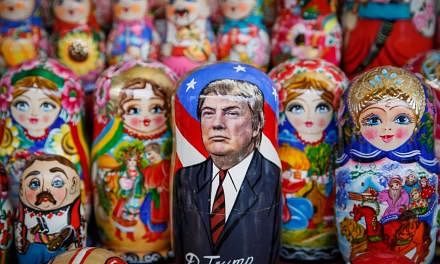Mr Donald Trump's philosophy is no secret. "I like making deals, preferably big deals," he wrote in his autobiography. "That's how I get my kicks." His approach to Asia will be much the same.
When he takes office as the 45th president of the United States, having won a stunning victory in the Nov 8 election, Mr Trump will hunt for deals, especially with major powers. The result will be a new age of brinkmanship and anxiety for smaller- and mid-sized Asian nations, in which growth from trade and globalisation is the ultimate loser.
This process will not begin immediately. Mr Trump does not take over until January. Asian economic and security policies developed over decades by the US State Department and Treasury will not be junked in just a few months.
Despite his campaign rhetoric, a full-scale trade war with China is unlikely, at least in the short term. Mr Trump could heighten tensions by labelling Beijing a currency manipulator, but economic ramifications from this will be limited. The 12-nation Trans-Pacific Partnership trade deal is now certainly dead, but many observers had given up hope on its passage anyway, even if some national trade practice on labour standards had tentatively been pushed in its direction.
It is also a mistake to label Mr Trump as a pure isolationist. As far as anyone can tell, the President-elect has little desire to cede regional leadership to China.
During the campaign, he spoke repeatedly about the importance of heavy new investment in American naval power, which would support that goal, especially around the South China Sea.
In the immediate term, many countries in Asean may find the new US President more congenial than the old. Mr Trump has no interest in offering lectures on human rights, democracy, climate change or corruption. For leaders in nations like the Philippines or Malaysia, this could see a short-term warming in relations.
Yet over the medium term, his hope of pushing US allies to contribute more financially and militarily to uphold regional security will have a profound impact. New deals with Japan and South Korea are likely, with Japan in particular unlikely to enjoy blanket protection under the US security umbrella. Having already reinterpreted its Constitution, Japan can be expected to re-militarise, leading to increased tensions with China, for instance, over the oil-rich Diaoyu/Senkaku Islands in the East China Sea.
The sight of these two historical Asian rivals reawakened and refocused on their competing territorial claims will have major repercussions for regional security and stability.
Smaller Asean nations like Singapore will have to seek ways to hedge themselves against declining American security protection. Japan's history with many Asean nations will not make them natural partners.
Over the long term, however, Mr Trump's greatest impact will be on trade and globalisation. After two decades of rapid expansion, globalisation has slid into reverse. Turning this around would require continued American leadership and patient cooperation with other nations in Asia to deepen economic integration and dismantle barriers to trade that have built up since the financial crisis. Mr Trump has no interest in such a task.
Over the course of a Trump administration, trade disputes are likely to mount as more sectors are labelled "strategic" and, in small increments, protectionist measures are introduced, leading to tit-for-tat responses.
US multinationals operating abroad will feel pressure to return economic activity to home soil. China need not even be the focus of all this; smaller Asian trading economies will be just as much in the crosshairs.
Although he is no friend of the environment, a more protectionist US will make greater use of trade rules on labour environmental and intellectual property standards. Stagnation in trade growth is likely to become the global norm, not the exception.
Of course, this protectionist finessing assumes US trade policy stays within the architecture regulated by the World Trade Organisation (WTO). Should Mr Trump simply stomp out of the WTO, as he has more than once suggested, he could have recourse to whatever punitive action he wants. Even if he avoids that drastic step, he believes that brinkmanship is the prelude to advantageous terms. On any particular trade dispute, he may be right. But his strategy is not going to deliver the broad agreements that have underpinned the last generation of global growth and brought prosperity to export-led South-east Asian economies.
Instead, Mr Trump's deal-making will create uncertainty, especially for smaller nations, as they watch to see what kind of arrangements will be worked out between larger powers.
The institutions that have underpinned economic growth in Asia, from the International Monetary Fund to the WTO, will also be weakened in this process. Into the gap, China will push a new regional order, strengthening its own initiatives, such as the Regional Comprehensive Economic Partnership trade deal.
China's proposals on trade and investment, which have sometimes now been viewed unfavourably by Asean nations, will soon be viewed with greater enthusiasm. Only four nations in Asean were signatories to the TPP.
Now, all of Asean's trading and investment patterns will refocus towards China.
Gradually, Beijing's circle of influence will expand. Asean nations will learn to operate in a newly uncertain Asia with two competing economic systems, rather than just one.
The first era of globalisation during the late 19th century was gradually undone by a period of renewed great power rivalry culminating in World War I. There is no reason to believe that Mr Trump's victory places the world on a similarly violent path, but the march of deglobalisation will be hastened nonetheless. Nations around Asia are going to have to learn to deal with it.
- Danny Quah is Li Ka Shing Professor of Economics, Lee Kuan Yew School of Public Policy, National University of Singapore. James Crabtree is visiting senior research fellow at the Lee Kuan Yew School, on sabbatical from The Financial Times.
